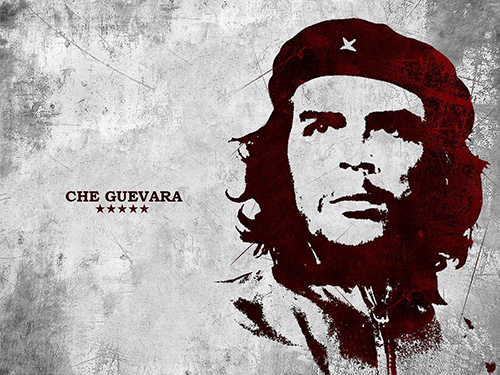Post-Islamic Awakening: What would Che say?
Empowering Weak & OppressedTahir Mahmoud
Safar 12, 1439 2017-11-01
Opinion
by Tahir Mahmoud (Opinion, Crescent International Vol. 46, No. 9, Safar, 1439)
As President Evo Morales of Bolivia attended the ceremony marking the 50th anniversary of Ernesto Che Guevara’s death, it was clear that Che’s ideas and legacy had triumphed over those of his adversaries: the US and its brutal Latin American proxies.
When Che arrived in Bolivia to start armed resistance against the CIA-backed military dictatorship, he was an unknown figure among a majority of Bolivians and a significant minority in the rest of Latin America opposed his ideas. Today, from Venezuela to Nicaragua, the ruling elites and masses in Latin America express fascination with the legendary revolutionary.
Anyone who familiarizes himself with Che Guevara’s writings and speeches will immediately notice his passionate advocacy for guerrilla warfare as the main vehicle for resistance against injustice. Che’s blunt rationalization for his position often made him unpopular among left-wing intellectuals sipping coffee in Paris and Moscow, while calling on the masses to sacrifice. Che was a doer, not merely a thinker.
If one could travel back in time and describe the events of the Islamic Awakening (aka Arab Spring) to Che, it would be interesting to hear his thoughts. Given his temperament, it can be surmised that Che would be appalled by the idea of standing in the street allowing oneself to be beaten up by the brutal security apparatus. One of the reasons the Algerian and Vietnamese resistance movements fascinated him was that they were not simply demonstrating. Che’s primary criticism of the leftist response to the 1954 CIA-orchestrated coup in Guatemala was that they refused to immediately resort to guerrilla warfare.
The world of 2017 is much different from 1967, the year Che was murdered in the jungles of Bolivia. The contemporary world is a complex socio-political drama where political machinations can compensate for hard-power disadvantages. This is something Che knew well even in his days and he famously stated that one political defeat could annul a series of military victories.
Today, this can best be observed in Syria. Since 2011, a cabal of over a dozen very powerful nations committed vast amounts of hard power to eliminate the presence of Islamic Iran in Syria but due to the prudent political and social policies of the Islamic leadership in Iran, the Zionist-imperialist project in Syria has failed. Thus, the political aspect of struggle has become even more important today than in 1967, especially due to the mass media.

One of Che’s trademarks for initiating change was to encourage indigenous populations to reclaim their inalienable rights. Due in large part to the US, he failed to accomplish this in Bolivia as only 20 Bolivians joined his group of 52 revolutionaries but the validity of his approach cannot be faulted.
One of the biggest criticisms of the groups involved in the Arab Spring from El Comandante would be their collusion with external forces with a sinister agenda. In the post-2011 Islamic Awakening, it is clear that in those locales where foreign “assistance” for indigenous movements was greater, the results were far worse than in places with less foreign support. Libya and Syria are prime examples of this phenomenon. As Tunisia caught everyone by surprise, the external actors failed to mobilize in time, thus Tunisia is doing better than Libya and Syria. In Bahrain, the people’s movement refused outright any foreign “assistance.” Of course Che Guevara was not naïve; he knew well that without some Cuban state support he would not be able to enter Congo or Bolivia safely and he took Cuba’s aid when and where needed. Nevertheless, his motto was, less external support is better than more.
Today, Latin America is closer to where he wished it to be. The Chavez factor and survival of the Cuban revolutionary government to this day are clearly achievements Che would be very proud of. The irony is that places like Bolivia, Venezuela, Ecuador, and Nicaragua, where leftist movements admiring Che exercise great influence within and outside of the government, became powerful through popular mobilization and ballot boxes. The path to ballot-box victory for leftist movements in Latin America was paved with decades of imprisonment, torture and other hardships.
The Muslim Brotherhood in Egypt went through a similar experience. Yet, the leftists of Venezuela and Bolivia did not make strategic compromises with the foreign propped ruling despotic caste. This mistake was committed in Egypt, for which Che would definitely have scolded the Muslim Brotherhood.
Most probably Che would have felt most attuned to the ongoing struggle in Gaza and Yemen today. Che’s writings closely relate to both situations. From his writings and speeches, it appears that he could relate to the struggle in Gaza and Yemen better than to Tunisia or Egypt. Che would probably view Gaza and Yemen as the only models in the Muslim East that have been able to dismantle the corrupt and oppressive internal ruling regimes, that have broad local appeal, and that have eliminated the occupying or meddling foreign presence.
Fifty years after Che Guevara’s death at the hands of the CIA, his ideas still scare despots worldwide as they did when he was alive. Che continues to be an inspiration to many justice-seeking people around the globe and is most likely to continue inspiring a new generation of strugglers in Latin America resisting foreign dominance, economic in-equality, and corporate exploitation. As for Muslims, Che’s famous saying “If you tremble with indignation at every injustice then you are a comrade of mine,” and dedication of his life to this motto makes him far closer to Islam than most Muslim rulers. This also makes him an unflinching supporter of the struggle of Imam Husayn (a).

